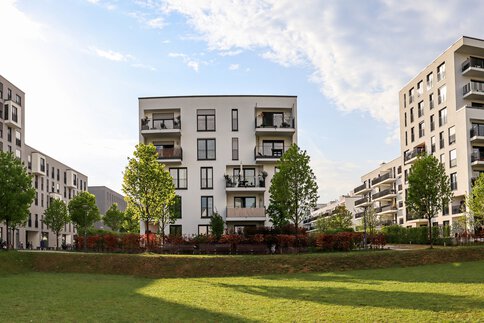Sponge city concepts: the future of water-conscious urban development
Adapting to the consequences of climate change is among the key topics at IFAT Munich 2024. When it comes to the term “climate-resilient communities,” the sponge city is considered an ideal being pursued in many countries.
The Intergovernmental Panel on Climate Change predicts that extreme weather events such as floods, drought, hot spells, and storms will become more frequent and severe due to climate change. Cities and communities are especially vulnerable due to their high concentration of people, value creation, and infrastructure. Communities worldwide are therefore called upon to equip themselves for the consequences of climate change.

Sponge cities: technically feasible and more livable
The conscious use of water plays a key role. “A water-conscious city, also referred to as a sponge city, is not only technically feasible, but also makes economic sense and enhances the quality of life for its residents,” as Prof. Dr. Uli Paetzel, President of the German Association for Water, Wastewater and Waste (DWA), points out.
The idea behind the term is the urban planning concept of retaining as much rainwater as possible in urban green zones, wetlands, and water and flood areas, instead of discharging it immediately and directly into channels and receiving waters. That requires sealed areas to be unsealed, and appropriate open spaces to be included in construction project planning. “Since open spaces in cities are scarce, they should ideally be multifunctional. For example, a playground can be designed to serve as a collection basin for the water during heavy rains,” Paetzel explains.
Ideally, these measures not only help mitigate the consequences of severe weather conditions, but also enable rainwater to be stored for dry periods. This water can be used to keep trees and green spaces alive, which, together with green roofs and facades, help cool the city and improve its air quality.
Many examples of sponge cities, but no widespread trend as yet
Since the pioneering projects in China about ten years ago, many cities around the world have implemented water-smart city concepts, including Singapore, Copenhagen, Vienna, and Rotterdam, as well as Hamburg, Berlin, Munich, Münster, Ludwigsburg and Leipzig. However, according to the DWA, it is not yet possible to speak of a widespread, established trend. “I am confident that the many benefits of the sponge city principles will be recognized by communities, urban planners and architects, and that the lighthouse projects to date will serve as models,” says Paetzel.
The transformation process requires time and support from all the stakeholders. “Our goal must be to remove the many personal, financial, institutional, technical, and legal obstacles as far as possible in order to drive development forward,” said the DWA President, adding that possible solutions included better information and networking of stakeholders, and adjustments to laws and technical regulations.
Sponge region and circular water city
In addition to establishing water-sensitive cities, there are ideas, visions, and projects that go beyond this approach. The concept of the sponge region extends the idea of the sponge city in spatial terms, so that forward-looking solutions for extreme hydrological situations can also be found in the surrounding rural areas. The World Economic Forum brought the “circular water city” into play. This vision combines the principles of the sponge city with comprehensive recycling and reuse of rain and wastewater, as well as recovering the energy and nutrients contained in wastewater.
More about water-conscious communities at IFAT Munich
Achieving water-conscious communities requires a variety of established and innovative products and solutions from the international environmental technology industry.
These include, for example:
- Rainwater storage tanks made of different materials
- Infiltration ditches
- Pumps
- Filters
- Water-permeable soil stabilization systems
- Programs for sizing infiltration systems
- Solutions for gray water recycling
- Small wastewater treatment plants
IFAT Munich traditionally provides a comprehensive overview of the relevant offerings. The next IFAT Munich, the world’s leading environmental technology trade fair, will be held at the Munich exhibition center from May 13 to 18, 2024. The extensive supporting program on May 16 will deal in depth with topics relating to water-conscious urban development in lectures and discussions.
